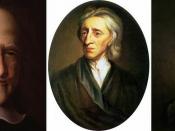Thomas Hobbes and Jean-Jacques Rousseau Thomas Hobbes and Jean-Jacques Rousseau both consider what life would be like outside of society, and in the state of nature. There are major differences in each philosopher's perspective on this topic. The major differences between each of these two philosophers views includes issues regarding human desires, and also the issue of morality. The underlying assumptions that both these philosophers believe in also differ greatly. Hobbes tends to place humans in the state of nature with the ability to reason and understand complex ideas. Rousseau on the other hand explains that humans could not have understood complex ideas, and that humans must have formed language and knowledge, which was not present in humans at the early stages of the state of nature.
Thomas Hobbes' philosophical view concerning the state of nature focuses on the desires of individual people and how those desires lead to a state of war.
Hobbes believes that people are going to have unlimited desires, and when something is desired, that in turn, will only lead to a desire for something else. Therefore, it follows that in the state of nature Hobbes believes that no morality exists, considering what is good and evil according to Hobbes is subjective and relies only on what each individual believes to be good or bad. According to Hobbes, an object or entity which someone desires would be considered good, and what somebody does not desire would be considered something that is evil. In Hobbes own words, "But whatsoever is the object of any mans Appetite or Desire; that is it, which he for his part Calleth Good"æFor these words of Good, Evil, and Contemptible, are ever used with relation to the person that useth them."� It is clear that Hobbes assumes humans understand some sort...


